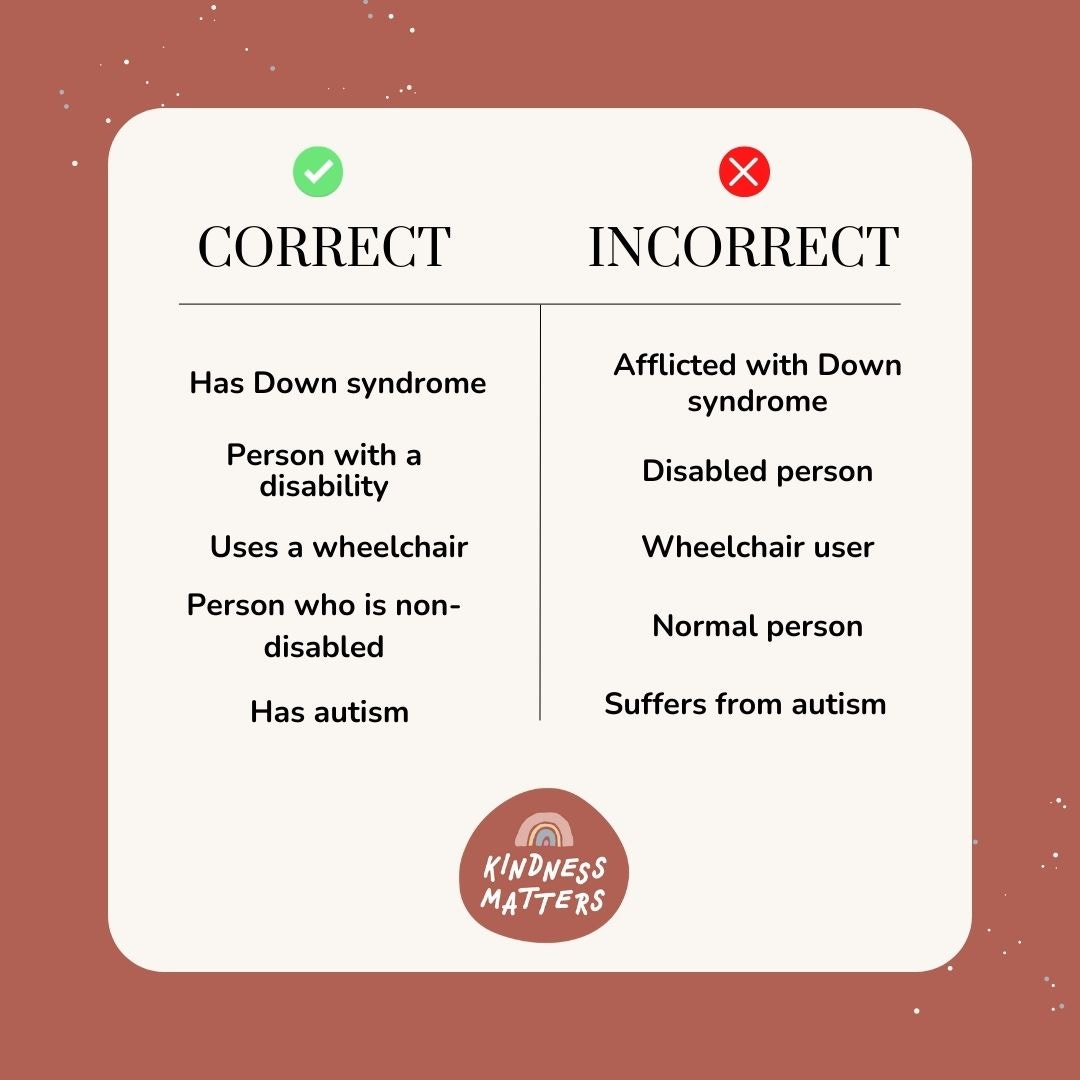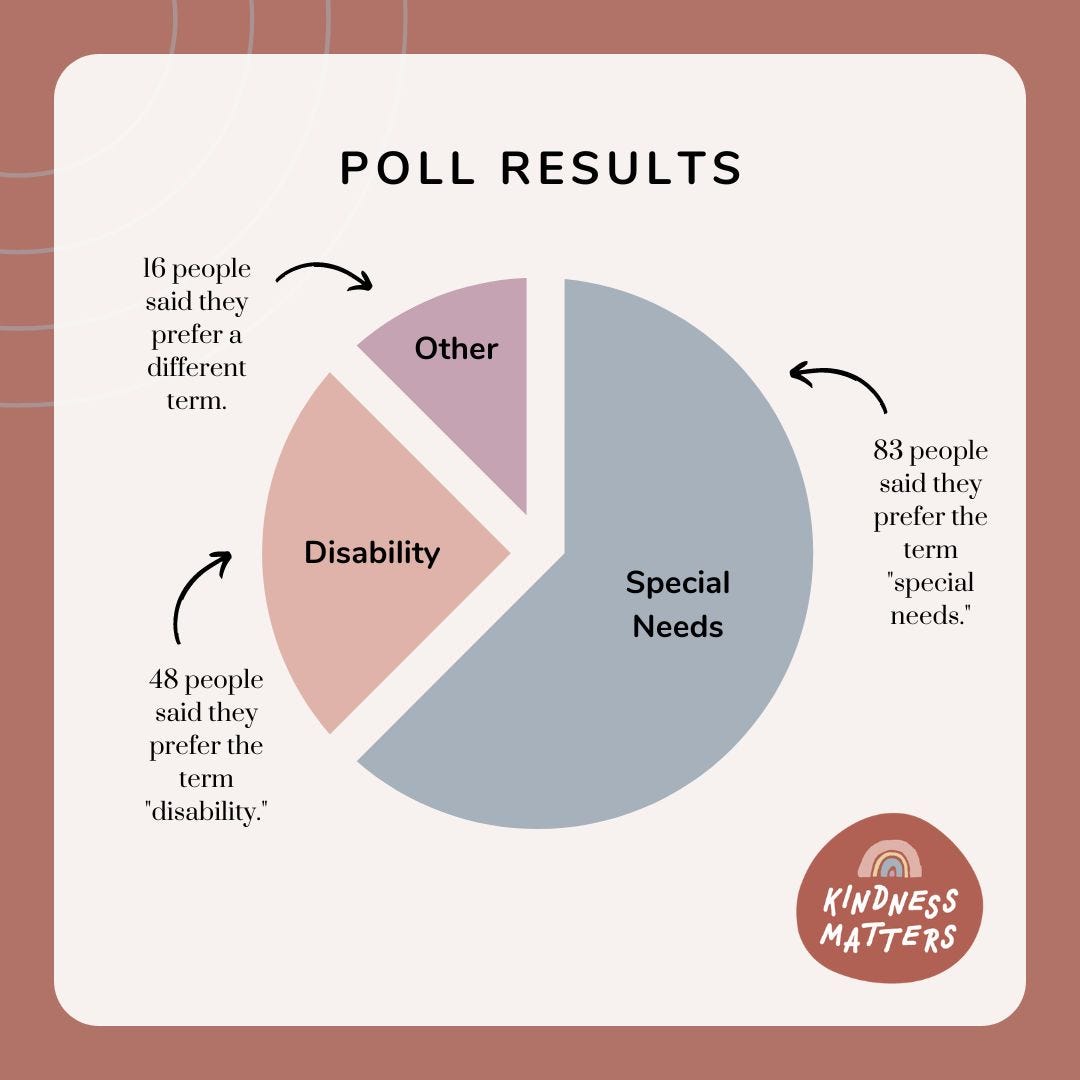About 54 million Americans have a disability, such as Down syndrome, Cerebral palsy, or autism.
As our society’s understanding of these conditions grows, so do the open discussions around special needs etiquette. Experts and those within the special needs community agree that the vernacular used when referring to these conditions is changing, but there are still differing opinions.
We recognize that regardless of opinions, people of all races, ages, sexes, genders, and abilities should be treated equally and without stigma. Unfortunately, stigmas still remain around the special needs community and people still use incorrect terminology.
To help dispel this and to educate our audience, Aeroflow Urology asked individuals with disabilities and individuals with loved ones who have special needs which terms they prefer and why.
History of Terminology
Let’s start the discussion by giving a brief history of disability vernacular.
Check Your Eligibility
2 Easy Steps
From catheters to pediatric and adult incontinence supplies, discover the continence care essentials covered by your insurance.
*Trigger warning: The following two paragraphs contain derogatory terms about special needs that may be offensive to some people. Aeroflow Urology only includes this language to give historically accurate information about the vernacular used for people with disabilities.
In the 1900s, people with disabilities were derogatorily referred to as “feeble-minded.” To describe a special needs person's functionality, people used the terms “high-grade” and “low-grade.” These terms were used by the medical community and the general population.
Near the end of the 1990s, people began using the terms “developmentally handicapped” or “intellectually disabled” when referring to people with special needs. The phrase “developmentally handicapped” was also used around this time, sometimes simply referred to as “handicapped.”
Terminology Today
As our society evolved and became more aware of political correctness and general etiquette for persons with special needs, the vernacular evolved into much of what it is today. Laws such as the People First Respectful Language Modernization Act of 2006 and disability activism have helped move society forward in eliminating the stereotypes and assumptions that once surrounded people with special needs.
Standard terms used today for people with disabilities are “special needs” and “disabled,” among others. In addition, the terms “high-functioning” and “low-functioning” are also sometimes in use.
People-First Language
The People First Respectful Language Modernization Act of 2006 had a significant impact on the vernacular we use today, which was enacted by the Council of the District of Columbia.
This act was to “require the use of respectful language when referring to people with disabilities in all new and revised District laws, regulations, rules, and publications and all internet publications.” To put it plainly, this act puts the person first, not the person’s disability. This applies when we are both speaking and writing.
Here’s a list of some people-first terms:
- Afflicted with a disability = Has Down syndrome.
- Disabled person = Person with a disability.
- Wheelchair user = Person who uses a wheelchair.
- Normal person = Non-disabled.
- Suffers from autism= Has autism.
Identity-first language, on the other hand, does the opposite, putting the identity (disability) first, rather than the person. An example of this language is:
- Autistic person rather than Person with autism.
- Handicapped person rather than Person with special needs.


Why Using the Correct Terminology Matters
Using incorrect terms when referring to a person with special needs is outdated and offensive. People with disabilities are people and their wishes and needs are to be respected, just as people without disabilities expect theirs to be.
While there are clear guidelines of what is acceptable, appropriate, and correct, there are still some differing opinions.
Which Term Do You Prefer? The Results
Aeroflow Urology reached out to different individuals and took to social media to ask which terms they prefer: “Special needs,” “disability,” or something else.
These were the results.
Email Survey
In a poll sent out to 147 subscribers, most people said they prefer the term “special needs.” Here were the results:
- 83 people prefer the term “special needs.”
- 48 people prefer “disability.”
- 16 people prefer the term “other.” People who chose "other" said they prefer to use:
-
- “Challenges”
- “Autistic”
- “Pelvic floor muscle challenged.”
- “Special heroes.”
- “People-first language.”
- "People with special perspectives.”
- “Differently-abled.”
- "Exceptional children.”


Instagram Poll
In an Instagram poll, 73% of voters said they prefer the term “special needs,” 26% prefer “disability,” and 0% voted for “other.”
In a second Instagram poll we conducted, 5 people stated that they prefer the term “special needs” and 3 people said they prefer “disability.”
Personal Responses
"I prefer the term special needs. We are not a family that gets offended easily, so we choose to use that term, but if others use different wording, we are very understanding. We've learned over this 12-year journey that most people have good intentions, and it doesn't benefit anyone if we get angry or offended so easily. We prefer this term because the word 'special' is a more positive term, meaning 'better,' 'greater,' or otherwise different from what is usual. Our boy's needs are different from the “usual” needs of kiddos their age and therefore require “special” care and 'special' attention.
I love to find the silver lining in things or a positive spin and so the term 'special needs' does just that for me. We love all three of our boys and try to give them what they need specifically, whether it's the ‘usual’ thing or a 'special' thing."
- Instagram user @daidrahamlin
"Honestly, I don’t prefer one way over the other. Neither offends me. And I’ve heard parents from both sides say one or the other rubs them wrong. Personally, if you’re talking respectfully about my child, and using person-first language, I’m happy."
-Instagram user @incaseyouredown
"Special needs is what we prefer. We see his [Theo's] needs as special, not a disability. Also, his needs are extensive and really trickle into so many different things in his life. For me, a disability is permanent… Theo's needs will change and evolve, and they will not always remain the same. I wouldn't be offended if someone used a different terminology like 'disabled.' For me, it's just personal preference."
- Angela Blymilller @angelablymiller
"I prefer to use the term disability but I do use both when sharing content on my page. I understand that many parents have not been educated on the term and so they may not realize that disorders like autism are indeed disabilities.
I don't mind using the term disability because I want to break the negative stigma surrounding the word. There is nothing wrong or dirty, just something different. I'm proud and hold my head high as I use the term in reference to my child.
I came into contact with an adult who was disabled in a support group who was an advocate for disabilities. She so kindly and graciously educated me on why the community as a whole doesn't like the term 'special needs.' The conversation shifted my perspective and made me realize that as an Ally, I don't want to ignore the community of which my child is a part of. I wanted to hear them and help make the change."
- Camille Robinson @momentsofjoypodcast
"I prefer to use the term 'disability.' I understand that many parents prefer the term 'special needs,' and it's the predominant term in some nondisabled circles. But 'special' can imply 'extra,' like when we say a person shouldn't expect 'special treatment.'
My daughter's needs, though, aren't icing on a cake. They're essential for her ability to access fundamental rights, like the right to enter public spaces, join peers in play, and communicate her ideas. Likewise, 'special' can suggest 'precious' or 'cute,' and her needs are neither– they sometimes require the hardy work of structural change.
Some folks feel hesitant to say the word 'disability.' I believe that reluctance is rooted in the belief that a disabled life is somehow inferior or a problem. But disability isn't a problem–it's an inherent part of human diversity. And if we're lucky to live long enough to have the full gamut of human experiences, we'll all at some point find ourselves disabled, temporarily or otherwise.
Disability, then, isn't 'special.' It's ordinary. It's human. If we treat it as such, we create a world where providing access for all people isn't a 'special' act but an essential, ordinary, expected one.
Some of my thinking on these terms comes from disability advocates themselves. For instance, in the poem 'Special Vans,' Laura Hershey writes powerfully about how the culture sees the word 'special' and the people it attaches to that word: 'The cops are wary of our bodies / they treat us in a special way, / special smiles, if you're lucky / special brutality when you're in the way.' I highly recommend reading the whole poem!
She concluded powerfully: 'Are these really special needs, / unique to only me? / Or is it just the common wish, / to be alive and free?'"
- Heather Lainer @heatherklanier
"I like special needs better. 'Disability' makes it sound like my child can't do anything. I always refer to her issues as special needs. It just sounds better to me. I also don't consider her to have a disability. I like to look at it as her just needing special care and needing extra help. She's not disabled in my eyes. She's a pretty happy kid despite her special needs."
-Crystal Chiatto, a member of the Aeroflow Parents Group.
Deciding Which Terms to Use
Whether you prefer "special needs," "disability," or something else, it's important to respect the people in the special needs community. Our language is ever-changing, so educate yourself and make sure you're using the correct terms.
We'd like to give a special thank you to all those who participated in our polls and to those who wrote to us with responses!
How Aeroflow Urology Can Help
Many children and adults with disabilities experience incontinence. If you or a family member is managing their incontinence symptoms, Aeroflow Urology may be able to help. We provide free incontinence supplies through Medicaid and some private insurance plans. Read below to see how it works.
See If You Qualify for Free Incontinence Supplies
Instead of running out to the store for your or your child’s incontinence supplies at the last minute, you simply fill out our qualification form—it's quick and easy to do.
Then, if approved, the incontinence supplies will be shipped directly to your home in discreet packaging every month, ensuring privacy and ease of use.
Disability Etiquette. (2019). Cerebralpalsy.org. https://www.cerebralpalsy.org/information/disability/etiquette
Appropriate Terminology | Student Accessibility Services. (n.d.). Www.brown.edu. https://www.brown.edu/campus-life/support/accessibility-services/resources-teaching-students-disabilities/appropriate-terminology
https://www.facebook.com/MeriahNichols. (2019, July 22). Meriah. Meriah Nichols. https://www.meriahnichols.com/politically-correct-term-for-disabled/
Lightner, L. (2019, December 3). Is People First Language dead? No, but demanding it is. A Day in Our Shoes. https://adayinourshoes.com/people-first-language/
Information provided on the Aeroflow Urology blog is not intended as a substitute for medical advice or care from a healthcare professional. Aeroflow recommends consulting your healthcare provider if you are experiencing medical issues relating to incontinence.









